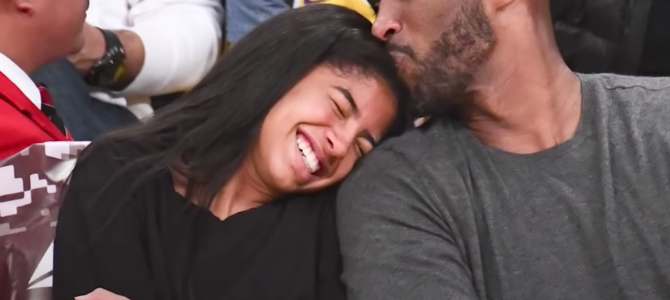
In the wake of Kobe Bryant and his daughter Gianna’s tragic deaths, a discussion of girl dads has been trending. Girl dads are those fathers who treat their daughters as daughters, loving and caring for them differently than they would if they were sons — a counterpart for a “daddy’s girl.”
A true girl dad, Bryant was especially proud of his daughters and loudly celebrated those parents expecting a baby girl. In one interview he told ESPN reporter Elle Duncan, who was expecting a daughter, “Girls are the best. … Just be grateful you’re being given that gift because girls are amazing. … I would have five more if I could. … I’m a girl dad.”
Even before Bryant’s death popularized the idea of girl dads, many big movies featured girl dads and promoted the image of caring men raising their girls to be strong and independent. The highest-grossing movie of last year, “Avengers: Endgame,” felt like a three-hour-long ode to girl dads: Iron Man, Hawkeye, Ant Man, and even Thanos were all girl dads. Many of the Disney princess movies have girl dads in the foreground, a point hilariously made in the second animated “Wreck-It Ralph” film, “Ralph Breaks the Internet.”
And these are just the more recent popular instances. Literature also shows examples of female protagonists growing up with girl dads: such as in “Emma,” “Silas Marner,” and “To Kill a Mockingbird.” One of the first instances that explicitly defines a girl dad in more philosophical terms was Miranda’s father in “Woman in the Nineteenth Century” by Margaret Fuller in 1845.
In the book, Fuller discusses the upbringing of her ideal self-reliant woman, Miranda, who is raised solely by her father. Because of this, Fuller asserts, Miranda could grow up free of the typical prejudices and social conditioning of women. Rather than become a submissive woman devoted to pleasing others and depending on men, she could become an independent, intelligent woman living a virtuous life on her own.
Girl Dads Defy Sexism
As one might expect, some people take a critical view of celebrating girl dads, especially ones accused of sexual abuse such as Kobe Bryant. In their opinion, there really shouldn’t be girl dads, but simply dads who raise their sons and daughters equally to overcome so-called sexist parenting, wherein fathers privilege sons over daughters. Moreover, they think it’s sexist to believe in the value of girl dads because doing so suggests fathers possess a special quality that mothers don’t.
However, one can safely grant the first objection — that fathers should raise their children equally regardless of sex — without dismissing the idea of girl dads altogether. A man who has a special regard or pride for his daughters doesn’t turn men who aren’t girl dads into chauvinist patriarchs. Just because Kobe Bryant and Dwayne “The Rock” Johnson have fun with their daughters doesn’t mean other fathers who aren’t self-identified girl dads must hate their daughters. There are girl dads and there are dads, and people can safely assume they both love their children.
If anything, girl dads are a direct response to those fathers who play favorites with their sons. They prove that this notion is outdated and unfair. Their love and devotion to their girls is a far more powerful message to society than a privileged activist reciting hackneyed grievances against a largely imaginary patriarchy existing in the Western developed world.
The second objection — that celebrating girl dads, or dads in general, is sexist — merits a wider discussion since it touches on deeper currents of modern feminism and parenthood. A prevailing belief among leftist feminists is that women can do everything men can do, and often do it better, so they should simply take over roles formerly held by men. On this basis, the more women do this in an organization or an institution, the more truly feminist it is. Organizations with fewer women, or fewer women in leadership, are sexist and unequal.
Under this logic, organizations with fewer women, such as the military, professional sports, computer companies, political institutions, or corporate boardrooms, are believed to be sexist. Even if women would rather not work in these fields, or do not do the work as well, or do not bring in as much money, these places need to hire and promote more women to prove they don’t hate women. CNN’s recent article on Trump’s lack of women in his coronavirus task force illustrates this idea well.
This attitude has naturally extended to fatherhood, the most male-dominated job of all. Again, women can do everything men can do, and do it better, so the term “father” seems like a patriarchal holdover meant to exclude and denigrate women; it’d be better to call them something neutral, such as “co-parent” or “guardian.” Women can discipline, protect, and provide for kids just as well, so men don’t need to act as fathers.
Girls Need Good Fathers
What this argument neglects, and why #girldad is trending, is that fatherhood is more than what a man does. It is what a man is. Even if men and women can do many of the same things, they shouldn’t necessarily be the same things. Men embody masculine virtues and values that contribute to a child’s development differently than women’s feminine virtues and values do. For that reason, if a boy or girl grows up without either a father or a mother, he or she is disadvantaged.
Because of culture and biology, men embody strength, constancy, and detachment, while women embody flexibility, empathy, and kindness. As fathers, men are a stabilizing force for boys and girls. They are uniquely suited to curb excesses, instill discipline, and create order. When the father is not present, both boys and girls suffer.
In boys, this looks like increased aggression, stubbornness, and alienation — what some people call “toxic masculinity.” In girls, this looks like deep insecurity, flightiness, and inconstancy. In terms of outcomes, boys without fathers are more at risk to become criminals, and girls are more at risk to become victims of exploitation.
Girl dads are popular because they are men who truly empower women. Through what they do, but more through what they are, they help girls become strong, confident, and independent. Furthermore, by becoming girl dads, men themselves become stronger and more masculine. Really, it is only when men retreat from their responsibilities or play favorites with their boys that they become weaker, flakier, and more cowardly.
Kobe Should Be Remembered as a Girl Dad
For those hoping to balance the power dynamic between men and women, girl dads offer a solution. They achieve the feminist and masculinist goals of empowerment and liberation through mutually beneficial complementarity, not zero-sum competition.
The pictures of Kobe sitting and smiling with his daughter are beautiful because they show the power of the father-daughter bond. People can see they made each other better, and many can attest to experiencing the same thing themselves with their fathers or daughters.
How ironic, yet how wonderful, would it be if Kobe Bryant, a legendary basketball player, is remembered more for the fatherly pride and love he displayed for his daughters than the fierceness and skill he demonstrated on the court? Those who care about women, families, and culture should encourage this part of his legacy — a girl dad who happened to be pretty good at basketball — and continue celebrating the work of parents in general. It’s a good thing for everyone.









